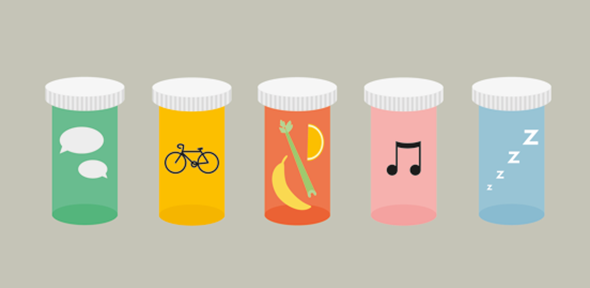
Since its launch last year, the Clinical School's Wellbeing Programme has heralded a culture change in attitudes to mental health and illness. Senior HR Adviser Caroline Newman explains how the programme is helping to dispel enduring myths about mental...
“We set out with a clear plan of what we wanted to achieve - to embed a culture of dignity in mental health across the Clinical School."
Even though she's a passionate advocate for mental health, Caroline Newman, Senior HR Adviser at the Clinical School, has been taken aback by the success of the Raising Mental Health Awareness programme she launched in April 2015.
During its first 12 months, with a budget of £6,500 from the Clinical School, there have been 17 lunchtime briefings for staff on topics as diverse as depression and anxiety to bereavement and post-traumatic stress disorder.
Eighty-eight managers have completed Mental Health First Aid Lite training, delivered by mental health charity Mind, a half-day course enabling managers to deal more confidently with mental health issues at work. The Clinical School has also signed the STOP Suicide organisational pledge – a Cambridgeshire-wide initiative for individuals and organisations.
“We set out with a clear plan of what we wanted to achieve,” Newman explains. “That was to raise awareness across the School and embed a culture of dignity in mental health. This fitted well with our Athena Swan agenda, and we also said we'd adopt the STOP Suicide principles.”
Feedback has been overwhelmingly positive. More than 387 people attended events run during Mental Health Awareness Week alone, and the October 2015 staff survey showed that 71 per cent of respondents knew where to find support services for wellbeing and mental ill health. “That's a powerful indicator that we are landing the programme well,” she says.
While the programme's aim is about changing culture rather than sickness absence, data show that compared with 2012 there was a 6.5 per cent decline in overall sickness absence in 2015. Within that reduced rate, 16 per cent more staff reported being off sick due to stress or mental ill health. “It's evidence of a change in culture,” says Newman, “and we have seen more people opening up to their line managers.”
Confident managers
As well as staff feeling more comfortable about raising mental health issues, training has also ensured that managers are more confident about dealing with them. “Before the training, managers wanted to support staff but told us they were anxious about it – unsure of what to say or concerned about making matters worse,” she says.
“Mental Health First Aid Lite training isn't about people becoming psychologists, it's about managers gaining the confidence to talk about mental health in the same way they'd deal with physical health issues, and knowing where to signpost people.”
Based on its success, the budget for year two has been doubled to £13,500, and as the project's remit has been extended to encompass physical health issues such as diabetes, nutrition and exercise, it has been rebranded as the Clinical School Wellbeing Programme.
Together with a new website and wellbeing newsletter, both already launched, this year's plans include training two Mental Health First Aiders for each department, and providing mental health crisis and suicide prevention training for all the School's first-aiders.
Keen to champion mental health, Newman is sharing the lessons learned at the Clinical School more widely. She now chairs the Biomedical Campus's Wellbeing Network meetings, so that the University, MRC, AstraZeneca and the NHS can share best practice and coordinate activities on key national days. She has presented the programme to the University's Wellbeing Steering Group and become a trustee for Mind in Cambridgeshire.
“Everyone wants to get involved, and that passion – as well as continual promotion and having a plan, but also being prepared to be flexible – has been crucial to our success.”
“We need to dispel myths about mental health and illness,” she concludes. “We spend so much time at work that our wellbeing at work is intimately linked with our home life. We're trying to cascade the message that whether you've got anxiety, or depression, or a more severe condition, it's OK. We know people can function well but, at certain points, they may need more support. In the same way that we'd support someone with a physical illness or injury like a broken leg – we'd make adjustments or potentially allow home working.”
